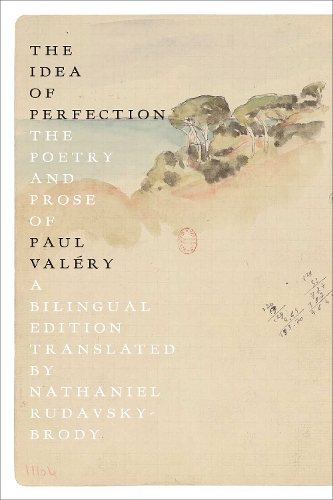
The Idea of Perfection: The Poetry and Prose of Paul Valry; A Bilingual Edition
(Paperback)
Available Formats
Publishing Details
The Idea of Perfection: The Poetry and Prose of Paul Valry; A Bilingual Edition
By (Author) Paul Valry
Farrar, Straus & Giroux Inc
Farrar, Straus & Giroux Inc
27th July 2021
United States
Classifications
General
Non Fiction
841.912
Physical Properties
Paperback
400
Width 153mm, Height 26mm, Spine 228mm
559g
Description
Heir to Mallarm and the symbolists, godfather to the modernists, Paul Valry was a poet with thousands of readers and few followers, great resonance and little echo. Along with Rilke and Eliot, he stands as a bridge between the tradition of the nineteenth century and the novelty of the twentieth. His reputation as a poet rests on three slim volumes published in a span of only ten years. Yet these poems, it turns out, are inseparable from another, much vaster intellectual and artistic enterprise: the Notebooks. Behind the published works, behind the uneventful life of the almost forgotten and then exceedingly famous poet, there hides another story, a private life of the mind, that has its record in 27,000 pages of notes revealed in their entirety only after his death. Their existence had been hinted at, evoked in rumors and literary asides; but once made public it took years for their significance to be fully appreciated. It turned out that the prose fragments published in Valry's lifetime were not the after-the-fact musings of an accomplished poet, nor his occasional sketchbook, nor excerpts from his private journal. They were a disfigured glimpse of a vast and fragmentary "exercise of thought," a restless intellectual quest as unguided and yet as persistent, as rigorous, and as uncontainable as the sea that is so often their subject. The Idea of Perfection shows both sides of Valry: the craftsman of sublimely refined verse, and the fervent investigator of the limits of human intellect and expression. It intersperses his three essential poetic works-Album of Early Verse, The Young Fate, and Charms-with incisive selections from the Notebooks and finishes with the prose poem "The Angel." Masterfully translated by Nathaniel Rudavsky-Brody, with careful attention to form and a natural yet metrical contemporary poetic voice, The Idea of Perfection breathes new life into poems that are among the most beautiful in the French language and the most influential of the twentieth century.
Reviews
"Amazing modernist work . . . Rudavsky-Brody's translations . . . are patient, thoughtful and often imaginative." --Michael Wood, London Review of Books
"Taken together, the prose and verse configure Valry as a writer and thinker tipped into the new century, which picked up speed with Futurism and Dada . . . Valry was a poet who came close to neoclassical perfection, as well as a modern thinker who understood how elusive perfection would always remain." --Allan Graubard, Los Angeles Review of Books
"Nathaniel Rudavsky-Brody's new selection of Valry's poems is welcome indeed. His translations are fresher than any previous English versions . . . The beauty and power of [Valry's] best writing is undeniable, and the human dilemmas his work addresses--mortality, embodiment, the longing for perfection--remain with us." --Mark Scroggins, Hyperallergic
[Rudavsky-Brody] has made newly available, in assiduously balanced and nuanced translations, all the significant poems of this now overlooked titan of French letters, and along with them, rousing extracts from Valry's extraordinary, posthumously published notebooks . . . Valry's literary legacy may be like the Roman mosaic recently discovered beneath an Italian vineyard, culturally defining but not presently alive. But the relation of his Notebooks to his published work is more like that of the vineyard's root system to its vines: they underpin and allow--they create, in fact--everything of which Valry's reputation consists. --Claire Messud, The New York Review of Books
"FSG's handsome bilingual edition of Paul Valry . . . intersperses the major poems with passages from the notebooks - a smart way of staging Valry's dissatisfaction with received form, while drawing attention to his repetitive, heartbreaking obsession with lost futures." --Hannah Sullivan, The Times Literary Supplement
"Rudavsky-Brody's version of Valry brings the work closer to our age and thus, to our ears. [It] manages to hold on to the incantatory sense of the French." --Sean Nam, The Dublin Review of Books
"A gratifying affirmation of Valry's central place in 20th-century literature . . . occasionally [Rudavsky-Brody's] lines are more striking than their French originals." --Adrian Nathan West, The Washington Examiner
The passages from the notebooks were a revelation . . . A fascinating introduction to a major poet in his selection of work. -Edmund Prestwich, The Manchester Review
Author Bio
One of the major figures of twentieth-century French literature, Paul Valry was born in 1871. After a promising debut as a young symbolist in Mallarm's circle, Valry withdrew from public view for nearly twenty years, and was almost forgotten by 1917 when the publication of the long poem La Jeune Parque made him an instant celebrity. He was best known in his day for his small output of highly polished lyric poetry, and posthumously for the 27,000 pages of his Notebooks. He died in 1945. Nathaniel Rudavsky-Brody was born in Columbus, Ohio. He has translated the work of French and Belgian poets, including Benjamin Fondane, for which he was awarded the Susan Sontag Prize for Translation. He is the author of two volumes of poetry in French and one in English, and has worked as a typesetter, a programmer, and a private tutor in Greece.
